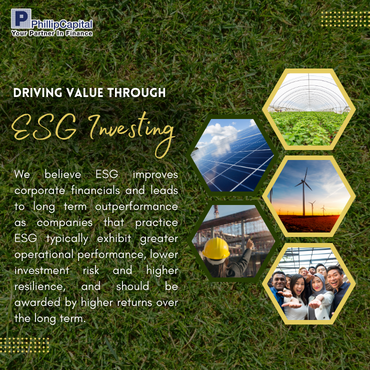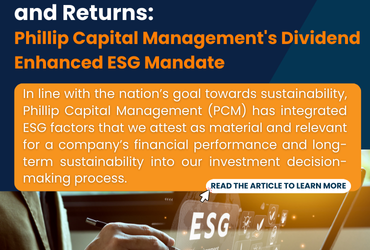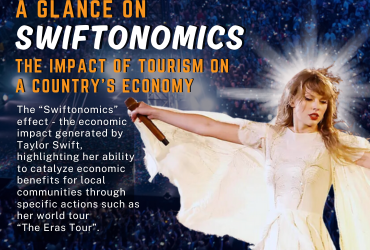
Environmental, Social and Governance (ESG) Investing, sometimes referred to as Sustainable Investing or Socially Responsible Investing, is an investment style which incorporates sustainability factors when making investment decisions alongside traditional financial analysis. ESG Investing evaluates how a firm could contribute to environmental, social, and governance goals and have an impact on society in addition to maximising profits for its shareholders. ESG is becoming increasingly popular among corporations, individuals, investors, and institutions.
ESG investing is long term as demand is led by investors
According to PwC’s Asset and Wealth Management Revolution 2022 report, ESG-focused assets will grow at a compound annual growth rate (CAGR) of 12.9% to USD 33.9 trillion in 2026, accounting for 21.5% of global assets under management (AUM) in less than 5 years. Similarly, according to Deloitte, Europe has the largest number of sustainable investment assets, totalling USD 14.1 trillion, followed by the US with USD 12 trillion. The motivation behind ESG at investment management firms is changing, which is spurring more fund launches. Client demand from both retail and institutional investors is now the most frequently cited reason given by asset managers for incorporating ESG factors into investment decisions.
The ESG regulatory landscape is evolving
Europe is leading the way by putting a regime for sustainable finance at the top of its agenda, while the US is taking its own efforts to regulate shifting investments towards more ESG-friendly initiatives. Meanwhile, ESG regulatory regimes differ across Asia Pacific, but the overall picture shows proactive efforts towards improved data and disclosures. Businesses appear to be getting their houses in order as ESG frameworks and policies are becoming increasingly common, reflecting an understanding of the roles of governance and social standards, as well as new environmental regulations.
ESG megatrends and opportunities are shaping our future
The growing ESG mandate in corporate governance emphasises the importance of businesses adopting ethics, transparency, and accountability in order to promote responsible business practices. A greater emphasis on ESG would allow more businesses to become compliant, ultimately promoting sustainable growth for current and future generations as well as value creation for businesses and their stakeholders. Forward-thinking businesses have already begun to integrate responsible business practices into their operations. Many businesses prioritise long-term sustainability, which leads them to consider the impact of energy use, waste, pollution, and other factors.
Paying attention to ESG considerations does not compromise return
We believe ESG improves corporate financials and leads to long term outperformance as companies that practice ESG typically exhibit greater operational performance, lower investment risk and higher resilience, and should be awarded by higher returns over the long term. Investors should ultimately stand to gain from wider adoption of ESG principles in corporate decision-making since a sustainable company is one that generates strong outcomes when measured using both conventional financial measurements and ESG-related parameters.
Some of the most important ESG investing factors are outlined in the table below.
| Environmental | Social | Governance |
| ∙ Climate Policies
∙ Energy Efficiency ∙ Waste Management ∙ Pollution ∙ Recycling Process ∙ Renewables ∙ Greenhouse Gas Emissions |
∙ Health and Safety
∙ Labour Standards ∙ Employee Benefits ∙ Diversity and Inclusion ∙ Human Rights ∙ Community Development ∙ Supply Chain Management |
∙ Anti-corruption
∙ Transparency ∙ Risk Management ∙ Corporate Governance ∙ Data Protection & Privacy ∙ Board Independence ∙ Board Diversity |
ESG Development in Malaysia
The SRI Sukuk Framework was introduced by Malaysia’s Securities Commission (SC) in 2014, setting the foundation for the nation’s transition to sustainable and responsible investment (SRI). Since then, the SC has remained supportive of several programmes designed to promote a sustainable capital market in Malaysia, such as the implementation of the Sustainable and Responsible Investment Roadmap for the Malaysian Capital Market (SRI Roadmap). Additionally, Bursa Malaysia and its index partner, FTSE Russell, have been evaluating the ESG practices and disclosures of publicly traded companies (PLCs) in order to match business sustainability initiatives with investors.
As a result, the FTSE4Good Bursa Malaysia Index (F4GBM) was introduced in December 2014. F4GBM Index is made up of constituents of the FTSE Bursa Malaysia EMAS index (FBM Emas) that meet a variety of environmental, social and governance criteria as defined by the ESG Ratings evaluated by FTSE Russell using FTSE Russell ESG Ratings Methodology. The FTSE4Good Bursa Malaysia Shariah Index (F4GBMS) was then launched in July 2021 by Bursa Malaysia and FTSE Russell to meet investor demand for ESG and Shariah-compliant index solutions. The F4GBMS index is designed to track constituents in the F4GBM Index that are Shariah-compliant as determined by Securities Commission’s Shariah Advisors Committee (SAC) screening methodology. As of December 2022, there are 98 and 79 stocks listed in F4GBM Index & F4GBMS Index respectively.
Phillip Managed Account for Retirement (PMART) and Phillip Managed Account (PMA) ESG
ESG is now becoming a priority for institutional investors and is gaining traction among investment managers. PhillipCapital Malaysia offers discretionary portfolio that invests in stocks with high ESG ratings from the F4GBM and F4GBMS Indices, namely PMART and PMA ESG. There are both conventional and Shariah options available. PMART and PMA ESG is suitable for investors who want to optimise the risk-adjusted return by constructing a diverse sustainable portfolio of ESG companies.
Please click on the link to learn more or email us at cse.my@phillipcapital.com.my if you require any further information.
Disclaimer:
The information contained herein does not constitute an offer, invitation or solicitation to invest in Phillip Capital Management Sdn Bhd (“PCM”). This article has been reviewed and endorsed by the Executive Director (ED) of PCM. This article has not been reviewed by The Securities Commission Malaysia (SC). No part of this document may be circulated or reproduced without prior permission of PCM. This is not a collective investment scheme / unit trust fund. Any investment product or service offered by PCM is not obligations of, deposits in or guaranteed by PCM. Past performance is not necessarily indicative of future returns. Investments are subject to investment risks, including the possible loss of the principal amount invested. Investors should note that the value of the investment may rise as well as decline. If investors are in any doubt about any feature or nature of the investment, they should consult PCM to obtain further information including on the fees and charges involved before investing or seek other professional advice for their specific investment needs or financial situations. Whilst we have taken all reasonable care to ensure that the information contained in this publication is accurate, it does not guarantee the accuracy or completeness of this publication. Any information, opinion and views contained herein are subject to change without notice. We have not given any consideration to and have not made any investigation on your investment objectives, financial situation or your particular needs. Accordingly, no warranty whatsoever is given and no liability whatsoever is accepted for any loss arising whether directly or indirectly as a result of any persons acting on such information and advice.







